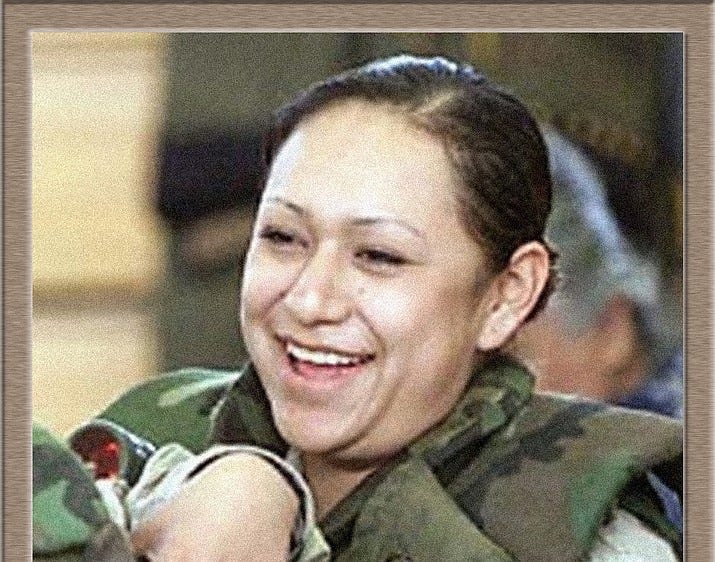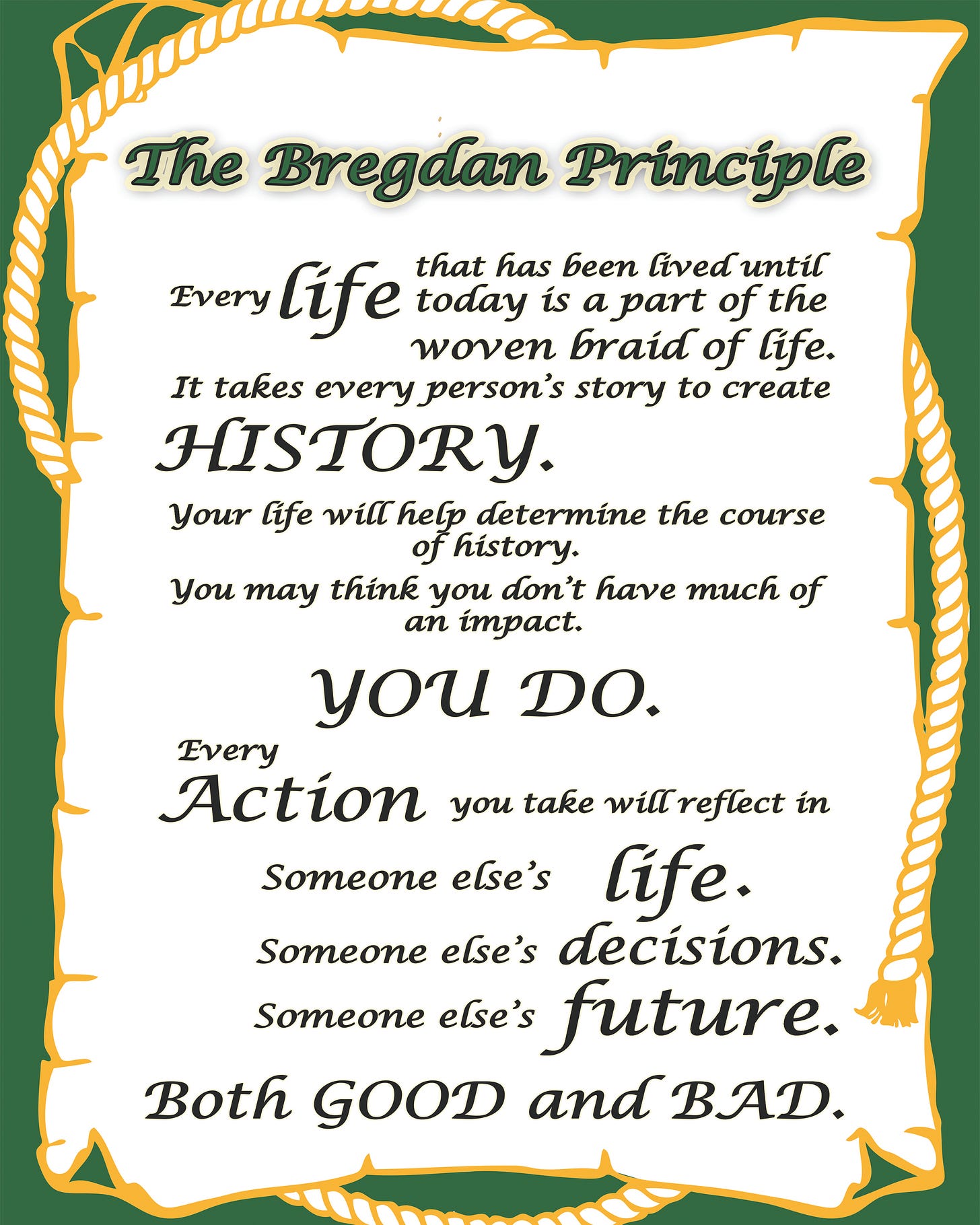Letter 29 - She Was Willing To Make The Sacrifice
Hello Bregdan Women,
You have Suess today…
Why was this Bregdan Women’s’ motto "Just Fix It?"
Lori Piestewa is known for her sacrifice, but those who loved her knew her for much more.
Lori laughed as the baseball pinged off the fence. Rounding 2nd base, and then 3rd, she knew she'd make it to home plate. Her dark hair flying in the wind, she laughed again. A friendly but fierce competitor, Lori was determined to win every time she played. More importantly, she was determined to do what was best for the team.
Her teammates cheered as she hit home plate for the winning run. Her family whooped! She felt loved.
Piestewa excelled at sports and started playing shortstop with the town’s Little League Softball team when she was eight years old. Her team made it to the championship game that year.
The day before the championship game, Piestewa was practicing ground balls with her coach when one of the balls hit her in the face and she broke her nose. While her family tried to deter her, she insisted on playing because “her team was dependent on her.”
They went on to win the game.
The little girl’s character grew stronger.
Lori Piestewa is Hopi Indian. Her Hopi name is Köcha-Hon-Mana meaning White Bear Girl. Piestewa, comes from a word meaning "water pooled on the desert by a hard rain." This fact would bring deep comfort to her family one day, but neither they nor she knew that on the day she won the baseball game.
It was simply a day of victory and celebration.
Lori came from a military family. Both Lori's dad and Grandfather had served. There wasn’t a lot to do in Tuba City, AZ. She was always looking for a way to challenge herself. When she started high school, she joined the Junior Reserve Officers’ Training Corps (JROTC). She became a commander and made plans to attend college.
Everything was going according to plan.
Until…
Lori discovered she was pregnant during her senior year. She married her boyfriend, and the father of her baby. He decided to enlist in the army. She finished high school a semester early, and their family moved to Fort Bragg, North Carolina.
They were happy for a time. After a second baby, however, they separated.
Lori returned to Tuba City, with some big decisions to make. She’d had a taste of the military and knew it could offer her stability.
She had to weigh that reality against the Hopi belief in nonviolence that she fully embraced.
Lori’s life centered around helping others.
She thought about her children. She thought about her parents, and how she wanted to help them as they aged.
She considered what she knew about a soldier’s personal challenges – not to mention the ultimate danger she would have to face every day.
"Mom, Dad, I've decided I have to do something. I must take better care of Brandon and Carla. I can't do it here in town. There's too much unemployment. I have joined the Army."
Her parents took in her children and supported her whole-heartedly.
Lori joined the army in 2001. After basic training, she was assigned administrative duties.
That all changed in 2003.
The United States went to war with Iraq.
Lori’s unit (the 507th) was deployed to Iraq. Lori, recovering from shoulder surgery, could have stayed behind but she petitioned to be deployed so she could stay with her unit – and be there to support her best friend and roommate, Jessica Lynch.
She was determined to be where she could help.
On February 17, Piestewa’s parents drove down to see their daughter off to Iraq. On that day, she did a television interview with her family where she said, “It’s very important knowing that my family is well taken care of,” and said with a smile that she was “ready to go.”
On March 23, 2003, the 507th was part of a convoy carrying supplies when they made a wrong turn and missed their checkpoint. Piestewa was driving a Humvee in the back of the convoy.
Along the way, Lynch’s truck broke down. Piestewa noticed and drove over to her, calling, “get in, roommate.”
It all went terribly wrong in the city of Nasiriyah.
Their convoy was ambushed.
The left tire of Piestewa’s Humvee was hit by a rocket-propelled grenade. The explosion killed three of the six soldiers. Lori, Jessica, and another soldier were gravely injured.
During the ambush, Lori, Jessica, and the rest of the convoy were all taken prisoner.
While held prisoner in a hospital in Nasiriyah, Lori, who had suffered a massive head injury, died.
White Bear Girl was only 23 years old.
On April 1, one week later, Jessica Lynch, the only survivor from their Humvee, was rescued by Special Forces.
The Special Forces team also recovered Piestewa’s body from a mass grave behind the hospital.
Later, in an interview, a comrade spoke of that fateful day in Iraq. "I asked her to switch places... We knew the drive back was even more dangerous than the first go round. She knew she'd be driving us straight into enemy fire. She maneuvered the Humvee like it was second nature. I asked her to switch. She said no. She was committed to finishing her duty. Completing her assignment. That was Lori."
. . . Lori determined to win every time she played and even more than that, to do what was best for the team.
That was Lori.
She was the first woman in the U.S. armed forces killed in the 2003 Iraq war and is the first Native American woman to die in combat while serving with the U.S. military.
Honored in many ways, from the coveted Purple Heart and Prisoner of War Medal, posthumously promoted from Private First Class to Specialist, to monuments, highways, and memorials throughout the U.S., Lori fulfilled her duty with the ultimate sacrifice.
None of the honors is why I’ve chosen Lori as a Bregdan Woman. I chose her because of what Wayland, her oldest brother, said.
“My sister is a warrior because she did the right thing, the honorable thing: going to Iraq when she didn’t have to, because she felt it was the ethical and moral thing to do. That’s what being a warrior is about: doing what’s right, even when it’s difficult and means sacrifice.”
Isn’t that the meaning of a Bregdan Woman? Doing the ethical and moral thing. Doing what’s right – even when it’s difficult and means sacrifice.
Lori Piestewa was a true Bregdan Woman!
In the Hopi tradition, the souls of the dead return to earth in a different form. Not as angels, but as moisture from the sky. Not long after she died in the hot desert of Iraq, it snowed in April in Lori's hometown of Tuba City, Arizona. Tuba City: a semi-arid climate with hot summers and mild winters. Tuba City which averages a mere 4 inches of snow per year. Tuba City which lists April as one of the three most pleasant temperate months of the year.
As her last name means "water pooled on the desert by a hard rain", her family believes this unusual snowfall was White Bear Girl's spirit bringing them a message of peace. She had returned to them... she always did what she said she would do. She came home. She did what was best.
I hope that today you catch the determination of White Bear Girl. White Bear Girl is a Bregdan Woman. She loved, lived, and died with principle and the belief in doing the right thing.
I know that it is tempting sometimes to take the easy way, find a short cut or quit.
However, living with yourself when you've cheated on yourself can be very tough.
We’re here to tell you that as Bregdan Women you can do whatever you have to do today.
I know Lori would agree with me when I say, “ Do the right thing and you'll never go wrong.”
**********************
What will you do today to impact history??
We’re on this journey with you… (We have 2 FREE gifts for you below!)
Ginny & Suess
CLICK THE IMAGE BELOW TO CLAIM YOUR FREE GIFTS!






What a wonderful young woman! Thanks so much for the inspiration ❤️
Yed .I do care for needy and ready to sacrifice for genuine, reasons.